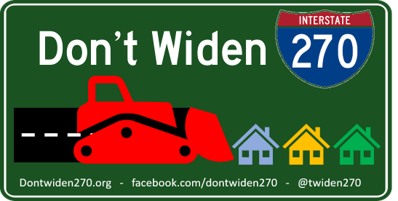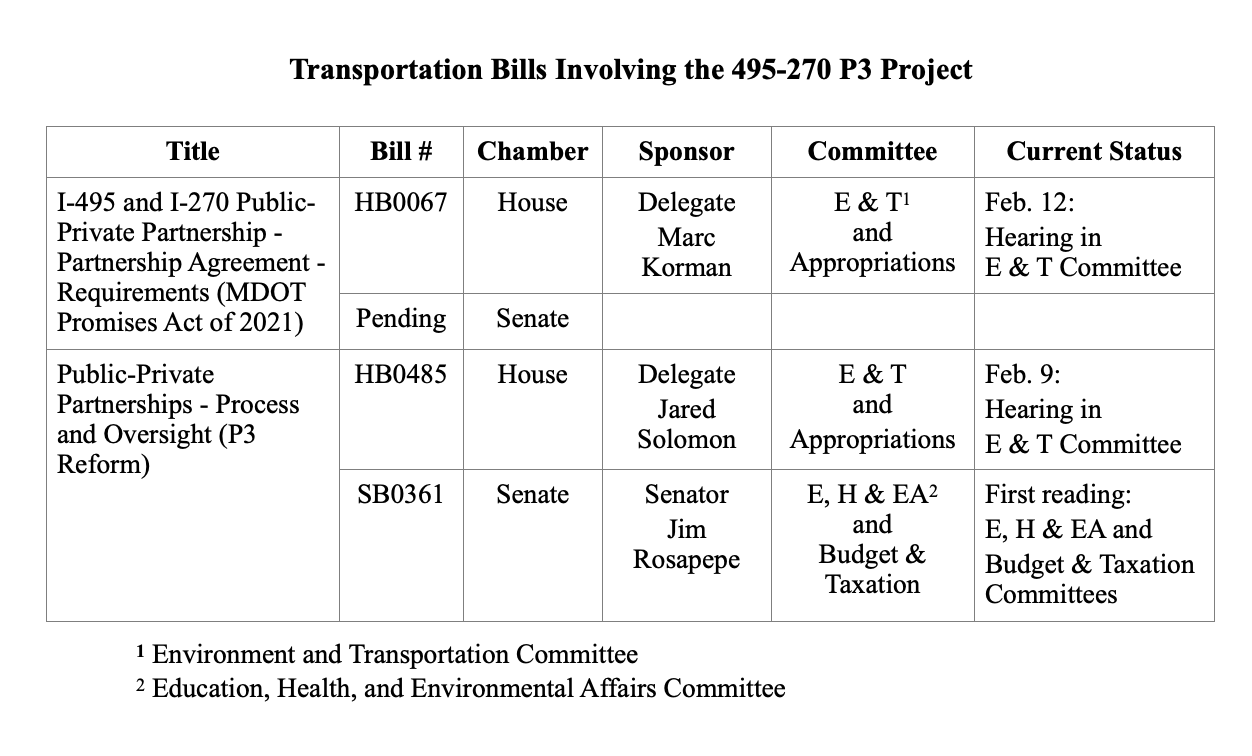Help Advance Key Legislation in the General Assembly
The 2021 Maryland General Assembly will be in session from Jan. 13–April 12, 2021. As of January 27, there were 745 bills filed in the House and 580 in the Senate. Others may still be in the pipeline but bills must be filed by Feb. 5 (House) and Feb. 8 (Senate) to be introduced this session. The following are two bills that Dontwiden270.org considers important to pass this year. Please refer to Action Item for how you can help.
Action Item
Write Delegate Kumar Barve, District 17, Chair of the House Environment and Transportation Committee, Urge him to bring HB0067 and HB 0485 to a vote in his Committee so there is time to get the bills passed in the Senate.
You can find your district number and legislators by typing your address here. Del. Barve represents D-17 and anyone in D-17 should be sure to include their home address so he knows they are from his district. But the more people who write to Del. Barve, including those from other districts, the better. Legislators respond to volume and Del. Barve’s actions affect many beyond his district.
Dontwiden270.org will keep you informed about future action items such as writing to committee members in key committees in both the House and Senate and then to the full House and Senate when votes are scheduled.
The Bills
HB0067: I-495 and I-270 Public-Private Partnership - Partnership Agreement - Requirements (MDOT Promises Act of 2021):
This legislation is similar to a bill (HB1249) that passed in the House of Delegates in 2020 by a vote of 97-36 but was ratified too late for Senate approval before the legislature adjourned.
Bill Summary: This bill puts in statute the promises the State, including the Maryland Department of Transportation (MDOT), made regarding the toll lane project. The bill would prohibit the Board of Public Works (BPW) from approving an agreement for the P3 project unless the agreement includes specific language. Among other requirements, the bill provides that:
No funding from taxpayers will be used to subsidize the project. All public dollars spent thus far shall be repaid as part of the P3 agreement.
At least 10% of toll revenue will be made available for transit for Montgomery and Prince George’s Counties. Buses and other transit will be able to use the toll lanes for free.
No home or land acquisition will occur until after the BPW approves the construction contract.
No P3 agreement will be submitted to the BPW until the final environmental impact statement (FEIS) is completed.
For more information on what HB0067 would do and why it is needed, refer to the Citizens Against Beltway Expansion (CABE) fact sheet.
HB0485 and SB0361: Public-Private Partnerships - Process and Oversight (P3 Reform):
This legislation is similar to a bill (HB1424) that passed in the House of Delegates in 2020 by a vote of 97-37 but was ratified too late for Senate approval before the legislature adjourned.
Bill Summary: This legislation would strengthen the process for reviewing large P3 projects and assess economic, legal, and technological risks to the State. It is not retroactive and would not apply to the I-495 & I-270 P3 but it is an important bill for ensuring oversight of future P3 agreements. Among other requirements, the bill would:
Create an independent P3 Oversight Review Board to ensure accountability for future P3 projects. The Board would review and make recommendations for all P3 pre-solicitation reports with a total value greater than $500 million.
Set new standards for financial and project disclosures for P3s.
Require a pre-solicitation report to include an FEIS that complies with the National Environmental Policy Act (NEPA).
Give the General Assembly Budget Committees 60 days to review and comment on the recommendations of the P3 Oversight Board before the BPW can designate the project as a P3.
The General Assembly Legislative Process
The Maryland General Assembly meets in session for 90 consecutive days from January to early April of each year. There are 47 senators and 141 delegates elected from 47 districts for a term of four years. The legislators are not term-limited. Each district elects one senator and 3 delegates. The House of Delegates currently has 99 Democrats and 42 Republicans; the Senate has 32 Democrats and 15 Republicans.
The legislative process is divided into 10 distinct stages:
Drafting and filing bills:
The State constitution mandates that bills be limited to one subject clearly described by the title of the bill. Bills on most subjects may be introduced in either chamber during the first 55 days of a session. Many bills are pre-filed; i.e., filed before the General Assembly is officially in session so that they can be introduced early in the session. The Department of Legislative Services prepares a fiscal analysis for each bill.First reading = introduction:
During the First Reading, a bill is introduced for the first time, and the bill number, name of the bill’s sponsor, and the title of the bill are read on the floor of the chamber, and assigned to a standing committee.Committee hearing:
The Senate President and the Speaker of the House of Delegates assign members to the standing committees and appoint the committee chairs and vice-chairs. During the committee hearings, the bill sponsor and their panel of witnesses present the bill to the committee. The public may provide testimony in support or opposition to the bill. The committee chair schedules periodic voting sessions on the bills that have been heard to decide whether to give each a favorable or unfavorable report, send the former to the full chamber with any amendments, or take no action.Second reading = committee report to chamber:
A bill that’s given a favorable report by the committee it’s assigned to is forwarded to the full chamber for consideration, debate and possible amendment.Third reading = floor vote:
During the third reading, the full chamber votes on the bill. An ordinary bill needs a majority vote to pass. A roll call vote must be taken.Crossover:
If a bill passes in the original chamber, it is sent to the other chamber for consideration, where further amendments may be considered and approved by that chamber.Resolution of differences:
If the two chambers differ, then a conference committee with members from each chamber may meet to come up with compromise language, or members of the two houses may confer informally to resolve differences. In any event, an identical bill must be approved by both chambers before midnight on the final day of session (Sine Die) to become law.Governor’s action:
All passed bills, except the budget bill and constitutional amendments, are presented to the Governor following adjournment of the legislative session. The governor can sign a bill, veto it, or let it become law without his signature. The Governor has thirty days to exercise his veto authority.Veto overrides:
If the governor vetoes a bill, the legislature can override his veto with a three-fifths vote of each chamber. If a bill is vetoed during a regular session, the legislature can consider a vote to override immediately. If the bill is vetoed after the session has been adjourned, the General Assembly may take a vote to override when it reconvenes for the next session.Effective date:
If a passed bill is not vetoed or a veto is overridden, it becomes law and takes effect on the date specified in the bill.
Maryland Taxpayers May Pay Millions of Dollars to Contractors
Governor Hogan promised that there would be no net cost to taxpayers for the toll lane project. However, it is apparent that Maryland may be stuck with multi-millions of dollars in expenses and future costs.
There are clearly huge on-going expenses and staff costs in the development of this proposal that have been and will continue to be borne by the MDOT-State Highway Administration (MDOT-SHA) with taxpayer funds.
The draft environmental impact statement (DEIS) shows that the cost to taxpayers could be hundreds of millions of dollars. The DEIS estimated the cash flow for each Build Alternative and pointed out that some models showed the State needing to provide subsidies of $482 million to $1 billion. If a State subsidy is required, it would typically be paid to the developer at the beginning of the contract. (Refer to DEIS pp. 2-48 and 2-49.)
A Washington Post article, “Maryland Could Face Millions in Cost Risks” reported that under a proposal for the project’s first contract, Maryland would have to pay up to $50 million to the contractor for ‘pre-development costs’ if the project does not move forward as planned. The State would be obligated to pay if the project is not environmentally, financially, or legally viable or does not receive federal or state approval.
News and Reports
Want more information about the I-495 & I-270 P3 project or transportation issues? Find links to recent and archived news articles on the Dontwiden270.org website tab “Media Archives.”
Reports, testimony, and correspondence with (and among) area politicians and stakeholders can be found on the website “On the Record” tab.
There’s Strength in Numbers. Please Help us Grow Our Mailing List
People who read our newsletters take action, and our elected officials take notice!
Help spread the word about what we can do to safeguard our environment and promote healthy, efficient, and fair transportation options. Tell your friends and neighbors they can join our newsletter email list by going to https://dontwiden270.org/get-involved and checking the "keep me informed" box. Our website is https://dontwiden270.org/.

